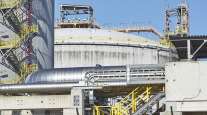Senior Reporter
Congressional Democrats Press for Climate Resilience in Infrastructure Policy

Democrats on the transportation authorizing committees are angling to incorporate climate resilience provisions into infrastructure policy legislation they plan to craft sometime this year, despite unwavering opposition from top Republicans.
“Our transportation sector is a major source of U.S. greenhouse gas emissions, contributing to the global emergency of climate change that’s facing us,” Sen. Tom Carper, the top Democrat on the Environment and Public Works Committee, said Feb. 27 at a conference hosted by the American Association of State Highway and Transportation Officials in Washington.
RELATED: Transportation Secretary Elaine Chao addresses autonomous tech, infrastructure at AASHTO briefing
Democrats in control of the House have kicked off the year’s legislative agenda with several hearings examining the science pertaining to climate. The House Transportation and Infrastructure Committee highlighted the potential effects of climate change on freight and commuter corridors on Feb. 26.
“The transportation sector is now the largest contributor to global warming in the U.S. Within the transportation sector, passenger and freight vehicles contribute 83% of global warming emissions. I intend to respond appropriately to this challenge as we move legislation and direct investment to transportation activities this Congress,” said Rep. Salud Carbajal (D-Calif.), reading remarks prepared by Transportation Chairman Peter DeFazio (D-Ore.). “So let’s get down to business, if you want to do the hard, messy work of legislating to reduce carbon emissions from transportation and build resilient infrastructure in an effort to tackle global warming.”
Democrats on the committee highlighted a need for new construction projects to be capable of withstanding the assault of severe weather events.

Graves
The Transportation panel’s top Republican, Rep. Sam Graves of Missouri, acknowledged the eagerness for bipartisanship on passing infrastructure policy legislation. Graves, however, rejected Democrats’ call for the adoption of an ambitious Green New Deal, a recent proposal that, if adopted, would transform the transportation system.
“Making our communities more resilient and reducing the environmental impacts of transportation require solutions based in reality, not fantasy,” Graves said. “The sweeping mandates that would come with proposals like the Green New Deal assume that government knows best, ignore the realities of our economy, and would cost as much as $90 trillion dollars, according to one new study.”
In February, a group of Democrats led by Rep. Alexandria Ocasio-Cortez (D-N.Y.) and Sen. Ed Markey (D-Mass.), unveiled the Green New Deal manifesto, aimed at significantly minimizing the country’s overall carbon footprint. The proposal, which promotes high-speed rail and modern travel applications, could be called up for a vote by congressional leaders. Critics argue the proposal could cost between $50 trillion and $90 trillion over 10 years.

Markey
“A Green New Deal is about jobs, and it is about justice. It would be the greatest blue-collar jobs program in a generation and repair the historic oppression of frontline and vulnerable communities that have born the worst burdens of our fossil fuel economy, all while saving the planet,” Markey said Feb. 7. “Our Green New Deal resolution outlines an historic ten-year mobilization that will mitigate climate emissions and build climate resiliency.”
Meanwhile, transportation stakeholders have reminded policymakers of ongoing efforts across the freight and passenger industries meant to improve fuel management and reduce carbon emissions.
“Aviation is a small part of the nation’s GHG footprint, but we have nonetheless strived to reduce our impact through technology, operations, infrastructure and alternative fuel advances to provide safe, vital, efficient, and environmentally sustainable air transport within the constraints of our air traffic management system,” Nancy Young, vice president of Airlines for America, told House authorizers.




